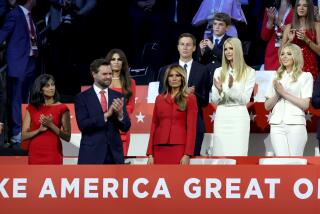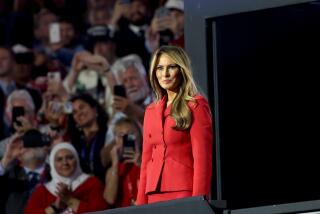A Catholic Debate on Abortion : Dialogue: Two Catholic women press opposing points of view in a debate on abortion. One represents a national bishops’ group.
- Share via
NEWTON, Mass. — In the eyes of the Roman Catholic Church, the issue of abortion is not even subject to debate. Abortion is impermissible. End of discussion.
Yet at Boston College, a decidedly Catholic institution, a range of views about the voluntary termination of pregnancy surfaced late last week when two Catholic women--one an opponent of abortion, the other a defender--held a debate about this sensitive and often difficult topic.
“We now live in a society where values come in conflict all the time,” Frances Kissling, the president of Catholics for a Free Choice, told an auditorium filled largely with students and faculty. “My point is that in the case of this fetus, we do not have sufficient knowledge or information to put a precise value on it.
“Yes, it is life,” Kissling said. “Yes, it is human. Yes, it is valuable. The question is, is it the moral, physical and legal equivalent of born life and of the woman in whom it resides? That is the question for me, and my answer is no.”
To which Helen Alvare, the director of planning and information, Secretariat for Pro-Life Activities, National Conference of Catholic Bishops, replied: “I often wonder why we spend so much energy and time trying to devalue something when we could just as easily value it. Why not have a society that accepts a woman, with her children?”
As for her mandate from the bishops’ group, Alvare says: “What we’re about is pretty basic. It’s about human life, and human life is equal and that is why we are advocating the rights of the unborn.”
Kissling, 47, represents a group that came into existence in 1973, the year of the U.S. Supreme Court’s landmark decision legalizing abortion in Roe v. Wade. She described Catholics for a Free Choice as an educational organization with about 10,000 supporters around the country.
Research by her Washington-based group and her own contacts with members of her church in coast-to-coast speaking engagements leads Kissling to believe that “people in the church are deeply divided on the subject of abortion. I think it is clearly the most volatile topic in the church--and it’s the one that the institutional church has put most of their money on.”
“I mean that both literally and figuratively,” said Kissling, who as a teen-ager entered a convent with the intention of becoming a nun but left without taking her vows. “This is where they have decided to draw their line in the sand.”
Alvare acknowledged that “Catholics have a variety of opinions about abortion” but balked at the idea of a “schism” among church members about abortion. Alvare, a lawyer with a specialty in commercial litigation before joining the National Conference of Catholic Bishops three years ago, said semantics are critical in a conversation about abortion.
“A schism connotes a deep fissure,” said Alvare, 30, who is pursuing a doctorate in theology at Catholic University. “It would not be appropriate to talk about a schism in this context. I would say there is a continuum of opinion about abortion among Catholics.” Overall, however, Alvare said, “Catholics are, I would say, more pro-life than Americans in general.”
The conference has done its own research on this subject, Alvare said. Last year it hired the Wirthlin Group, a Washington polling organization that served Ronald Reagan during his quest for the White House and during his presidency.
The bishops’ group also engaged the services of Hill & Knowlton, a leading public relations concern in Washington, to launch what one Hill & Knowlton executive called “a broad-based public education and information campaign to make the bishops better heard on abortion. Alvare called the bishops’ pro-life efforts a “multimillion-dollar campaign.”
At Boston College on Thursday, both women marched out statistics. “Dueling experts” is what Kissling called them when, for a moment, she and Alvare were in a position where they might have tried to out-expert each other.
With terminology at a premium, Alvare refused to accept Kissling’s preferred pro-choice label. “I like to get at what is being chosen when someone uses the term pro-choice ,” Alvare said. “I like to use the term advocates of legal abortion. “
But Kissling rejected that characterization. “I would say it’s exactly the opposite,” she said. “I think that abortion is something to be avoided if at all possible. I think the decision to abort should only be made as a last resort, when other options have failed.
“Most women do not come easily to the decision to have an abortion,” Kissling said. “When you set out with the 25 things you most want to do by the time you’re 45, having an abortion is not on the list.”
Still, Kissling said, “ultimately, once a woman is pregnant, only she can evaluate and make the decision about whether she is going to bring new life into the world.”
Alvare mixed theology with what she called “celebrational or cultural” (as opposed, she said, to “radical”) feminist philosophy to ask, “Has using abortion as a means to solve women’s problems served women’s dignity, or has it undermined women’s dignity?
“Frankly, I believe that the illogic of a position that claims that abortion is a solution to feminist problems will fall under its own weight,” she said.
To anyone who might wonder why a woman has chosen to carry the flag on abortion for the bishops group--a group of men, after all--Alvare rejoined, “It strikes me as sort of sexist to be surprised to find a woman in this role.”
But Kissling was not about to overlook the way she contends that gender politics can temper Catholics’ view of abortion. “The deepest reason” for the church to demonstrate such opposition, Kissling said, “is because you have a government system in the church which requires for power only two things: one, you have to be a priest and only men can be priests; and two, you have to say, by taking a vow of celibacy, that people who do not have sex are holier, closer to God and better qualified to rule than people who do have sex.”
She said that commissioning the Wirthlin Group, hiring Hill & Knowlton and placing Alvare in such a high-visibility position showed that the bishops group is stepping up its right-to-life activities.
“It must have cost them a lot in their hearts and minds to turn the spokesmanship on abortion over to a woman,” Kissling said.
Alvare said the Catholic Church permits no deviance from its position from abortion. But Kissling said her vociferous pro-choice activities do not represent defiance of the church.
“I don’t consider myself to be a defiant person,” she said. “I don’t agree with the Catholic Church on this issue. But I have a right to disagree.”
Dialogue among conflicting factions of Catholics is essential, Kissling said, and probably long overdue. This was the first public face-to-face meeting for Alvare and Kissling. Both said they were uncertain if the debate would be repeated.
“If Israelis and Palestinians--” she paused to correct herself--”all right, if some Israelis and some Palestinians can sit down and talk, then people who believe abortion should be legal and people who believe it should not be legal should sit down and talk.”
More to Read
Sign up for Essential California
The most important California stories and recommendations in your inbox every morning.
You may occasionally receive promotional content from the Los Angeles Times.













